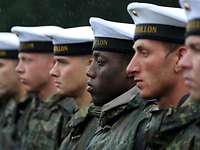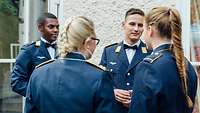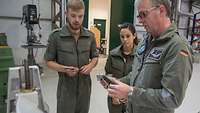Diversity in the Bundeswehr
The Bundeswehr has gotten more diverse. Women, men, people from an immigrant background, LGBTQ+ people, people with a disability, older and younger people are all a valuable part of the armed forces. They fill the troops with life, represent the diversity of the Bundeswehr and strengthen its ties to our – diverse – society.

Diversity makes the Bundeswehr fit for the future
Derived from the Latin word “diversitas” (difference, variety), the term “diversity” describes the differences between people. When the Bundeswehr talks about diversity, it means male and female military personnel and civilian employees, young and old, experienced or starting out, people with and without health impairments, religious or not, with and without an immigrant background and from different social backgrounds, with different sexual orientations and lifestyles. While each of these people is unique, it is important to recognise and value their heterogeneity as an asset for the Bundeswehr and its long-term viability.
Background, religion, gender and age – equal opportunities for all
The Federal Ministry of Defence expressed the political will to pursue this approach by signing the Diversity Charter in 2012. This document, which was initiated in 2006, has been signed by some 3,000 businesses in Germany so far. In the Charter, the signatories affirm that they will promote a working environment that is free of biases.
The intention is for all employees to receive the same appreciation and support, regardless of their nationality, ethnic origin, religion, gender, belief, disability, age, and sexual orientation or identity. The Bundeswehr must work to promote diversity and eliminate prejudice.
Diversity as a response to change
Diversity in the Bundeswehr puts into effect not only the equality required by the Basic Law for the Federal Republic of Germany and the General Act on Equal Treatment (AGG), but also the commitment made by signing the Diversity Charter. The potential it offers the armed forces with their high personnel requirements should not be underestimated.
A lot has changed for the troops in the past decade. Changing security parameters have set a new course for military policy. In 2011, the German Bundestag suspended compulsory military service. The goal was an army on operations. After Russia’s 2014 annexation of Crimea, the focus returned to national and collective defence. The armed forces are now struggling to restore their personnel to the necessary levels. In this regard, the Bundeswehr is in direct competition with industry and trade for a shrinking pool of applicants.
Diversity makes the Bundeswehr attractive
While the Bundeswehr still had a force level of around 250,000 career service members, temporary-career volunteers, military service volunteers and basic service conscripts in 2009, this figure had dropped to an all-time low of just under 177,000 military personnel by 2015. At the same time, the number of applicants decreased due to demographic changes. In order to counteract these developments, the Bundeswehr launched several programmes to make service in the armed forces more attractive. As a result, the Bundeswehr’s personnel numbers have recovered slightly: at the end of 2019, some 182,000 military personnel were serving in the armed forces.
Diversity as an element of the Bundeswehr’s organisational and leadership culture
Before compulsory military service was suspended, just under one fourth of the Bundeswehr’s military personnel consisted of military service volunteers and basic service conscripts, who represented a predominantly male cross-section of the German population. On action days such as Diversity Day, the Bundeswehr shows its support for diversity in the workplace in keeping with the #flagfordiversity initiative. In order to remain fit for the future in terms of personnel, the Bundeswehr regards diversity as an opportunity. The armed forces will continue to develop their organisational and leadership culture further in line with this approach.




